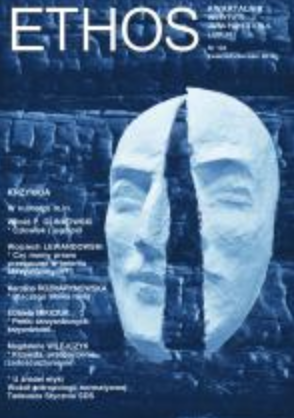CZŁOWIEK I KRZYWDA. Między homo explorens a homo rapiens
The Human Being Facing Wrongs: Between homo explorens and homo rapiens
Author(s): Marek SzulakiewiczSubject(s): Christian Theology and Religion, Ethics / Practical Philosophy
Published by: Katolicki Uniwersytet Lubelski Jana Pawła II - Instytut Jana Pawła II, Wydział Filozofii
Keywords: wrong; homo explorens; homo rapiens; self-harm; harming others; harming the world
Summary/Abstract: Wrongs, those experienced and those done to others, are inherent in the drama of human existence. A philosophical debate on wrongdoing and wrong done usually involves deliberations on issues such as sin, blame, evil and forgiveness, focusing on the condition wrongs introduce, on the way they are experienced, or on their consequences. The present article, however, is an attempt to approach the issue of ‘wrong’ in terms other than those characteristic of moral philosophy or ethics. The author addresses the following questions: What actually happens when a wrong has been done? What is the essence of being a wrongdoer (homo rapiens)? What happens to the world, to being as such, and to human beings once a wrong has been done? What kind of relation between the wrongdoer and the world does a wrong reveal? The above questions about the nature of wrongs and wrongdoing do not fi t in the area of ethics, rather, they signal and call for a metaphysical approach. The problem of the metaphysics of the wrong comes fully—and dramatically—to light once we consider how wrongs affect human beings, those harmed and those unharmed by them, and—last but not least—being as such. In these ramifications, it does not suffice to see wrongs merely as evil or undeserved harm. Evil and suffering are by no means the only aspects of a wrong. A metaphysical analysis shows that its nature lies in diminishing everything that is important, significant and elevating. A metaphysical ‘reading’ of wrongs prompts the following hypothesis: A wrong results from an action (or an activity) of a human being who introduces a change detrimental to the world. One may point to three aspects of human action that results in wrongdoing, and, consequently, to three areas of being affected by wrongdoing. Firstly, wrongdoing is an action directed against the subject who commits it. Secondly, it is an action directed against another human being (or other human beings). Thirdly, it is an action directed against the entire reality (or being). In undertaking the issue of ‘wrong’ it is crucial to address firstly the problem of the human being as such, since it is the human being that wrongs affect in the first instance. Therefore a rightful attempt to comprehend wrongs involves, above all, an insight into anthropology rather than an analysis of human actions and their consequences.
Journal: Ethos. Kwartalnik Instytutu Jana Pawła II KUL
- Issue Year: 31/2018
- Issue No: 2
- Page Range: 40-62
- Page Count: 23
- Language: Polish
- Content File-PDF

